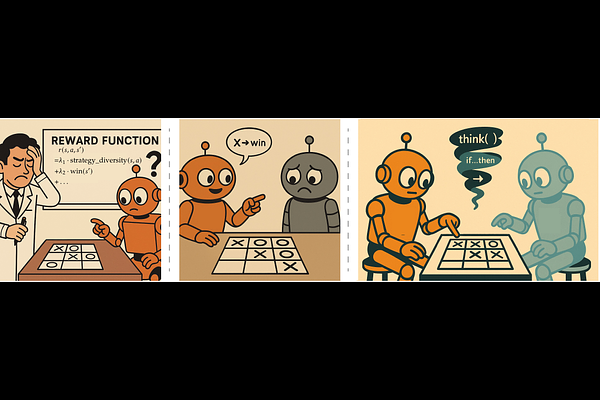SPIRAL: Self-Play on Zero-Sum Games Incentivizes Reasoning via Multi-Agent Multi-Turn Reinforcement Learning

SPIRAL: Self-Play on Zero-Sum Games Incentivizes Reasoning via Multi-Agent Multi-Turn Reinforcement Learning
Bo Liu, Leon Guertler, Simon Yu, Zichen Liu, Penghui Qi, Daniel Balcells, Mickel Liu, Cheston Tan, Weiyan Shi, Min Lin, Wee Sun Lee, Natasha Jaques
AbstractRecent advances in reinforcement learning have shown that language models can develop sophisticated reasoning through training on tasks with verifiable rewards, but these approaches depend on human-curated problem-answer pairs and domain-specific reward engineering. We introduce SPIRAL, a self-play framework where models learn by playing multi-turn, zero-sum games against continuously improving versions of themselves, eliminating the need for human supervision. Through self-play, SPIRAL generates an infinite curriculum of progressively challenging problems as models must constantly adapt to stronger opponents. To enable this self-play training at scale, We implement a fully online, multi-turn, multi-agent reinforcement learning system for LLMs and propose role-conditioned advantage estimation (RAE) to stabilize multi-agent training. Using SPIRAL, self-play on zero-sum games produces reasoning capabilities that transfer broadly. Training Qwen3-4B-Base on Kuhn Poker alone achieves 8.6% improvement on math and 8.4% on general reasoning, outperforming SFT on 25,000 expert game trajectories. Analysis reveals that this transfer occurs through three cognitive patterns: systematic decomposition, expected value calculation, and case-by-case analysis. Multi-game training (TicTacToe, Kuhn Poker, Simple Negotiation) further enhances performance as each game develops distinct reasoning strengths. Applying SPIRAL to a strong reasoning model (DeepSeek-R1-Distill-Qwen-7B) can still lead to 2.0% average improvement. These results demonstrate that zero-sum games naturally develop transferable reasoning capabilities, highlighting a promising direction for autonomous reasoning development.